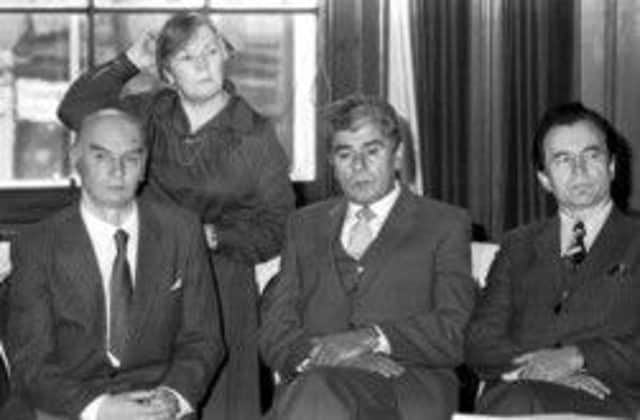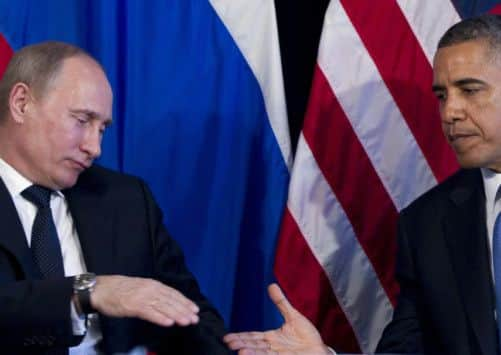Scotland can provide secure forum for global disputes


This is a difficult time for the world as we face serious tensions in the Middle East. Thirty years ago this month, the situation was similar. On 1 September that year, fighter jets from the Soviet Union shot down a South Korean jumbo jet near Sakhalin Island, in the Sea of Japan, killing all 269 people on board. The Cold War was at its peak.
On 17 September 1983, a group of senior Soviet military officials, diplomats and academics arrived in Edinburgh for the third round of discussions which had come to be known as The Edinburgh Conversations. Sub-titled “Survival in the Nuclear Age”, the first two meetings, alternating between Moscow and Edinburgh, had been successful in easing suspicion between participants and beginning a process of increased mutual understanding. The host was the University of Edinburgh, whose then Principal, Sir John Burnett, ably co-chaired the Conversations. Also taking part were influential military, diplomatic and academic experts from the UK and the USA. The key player was Professor John Erickson, head of the University’s Department of Defence Studies, a world-renowned expert in Soviet military affairs, whose stature and independence drew the participants to Edinburgh.
Advertisement
Hide AdAdvertisement
Hide AdThe University held a press conference on the Sunday before the Conversations commenced. The media expressed shock that the talks could take place so soon after the attack on the airliner. The atmosphere was strained at first, but the conversationalists had already begun to build relationships and trust in the two earlier meetings.


As he did throughout the series of talks which lasted until 1989, the hard-working Secretary to the Conversations, Michael Westcott organised social gatherings which broke the ice and raised the spirits of the group, so much so that, one evening that week in 1983, a Soviet participant sat down at a piano in St Cecilia’s Hall in the Cowgate and led, in Russian, a rendition of Auld Lang Syne.
The Edinburgh Conversations were characterised by the frankness and forthright nature of the discussions – and by the mutual respect and intimacy they induced. The informality, limited numbers, relaxed venues and social contact enabled one-to-one relationships to be established and the debunking of stereotypes.
Minds which had been closed were opened as new ways of communicating and thinking were explored. Rather than come up with solutions, Professor Erickson’s insistence on academic rigour compelled those involved to find common ground and explore options, based on proper research and accurate information.
It has been said that the Edinburgh Conversations played a significant role in the thawing of the Cold War, in stimulating meetings such as those between presidents Reagan and Gorbachev to discuss nuclear arms reduction and in the emergence of perestroika and glasnost in the Soviet Union, which broke the old communist mould.
What is the relevance of all this 30 years later? Arguably, the world faces similarly serious challenges to its security and stability – and its survival. Not only the Middle East but climate change and energy security present seemingly insuperable impediments.
As tensions mount, nations and politicians take positions, become polarised and resist constructive negotiation. Paradoxically, these are the moments when dialogue is essential.
The Edinburgh Conversations showed that a small nation, with no obvious axe to grind, and a reputation for hospitality and fairness, could offer a safe place for private engagement. The presence of individuals of high-standing, absolute integrity, and a willingness to subordinate personal or institutional gain for the greater good, was crucial in building a trusted forum. They could say things, and test ideas, in a way that politicians and senior officials in public could not.
Advertisement
Hide AdAdvertisement
Hide AdThere is really no reason why Scotland should not aspire to play a similar role in today’s world in appropriate circumstances.
There are areas of global concern in which we are showing leadership, such as climate change. On the other hand, how we handle our own internal conversations on our constitutional future is likely to influence those we might invite to the table from elsewhere. We need to demonstrate that we have the capacity to conduct our own discussions with dignity and respect for differing views, alongside rigour and integrity on the key issues. We have shown that kind of leadership in the past. Can we do so again?
• Dr John Sturrock QC is a mediator and participated in the 1986 Edinburgh Conversations as an assistant to Michael Westcott